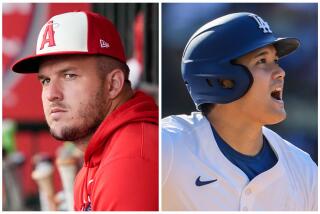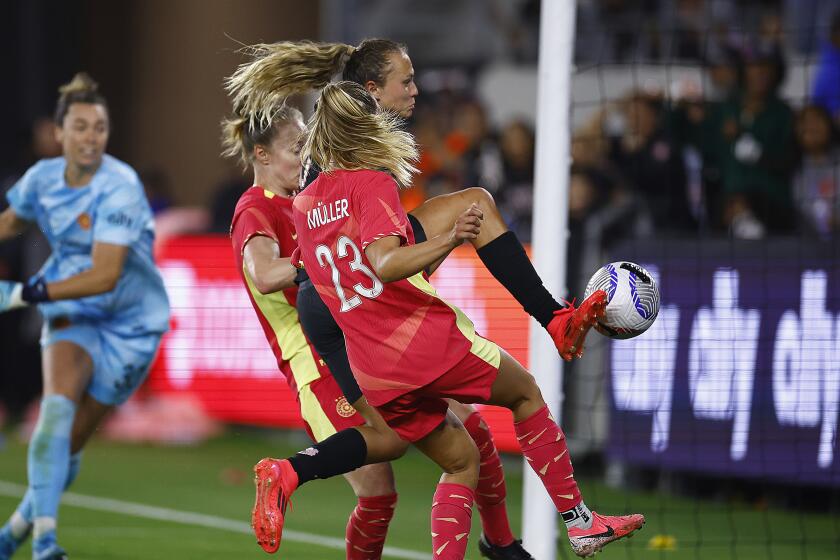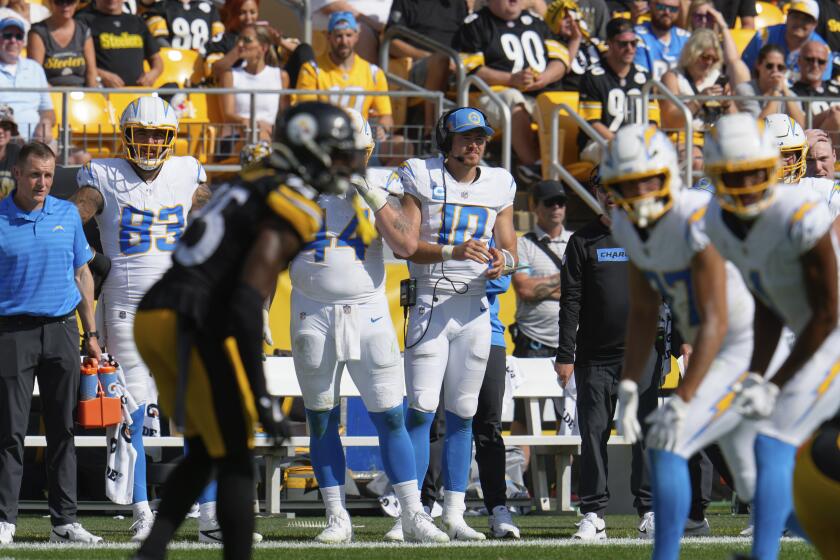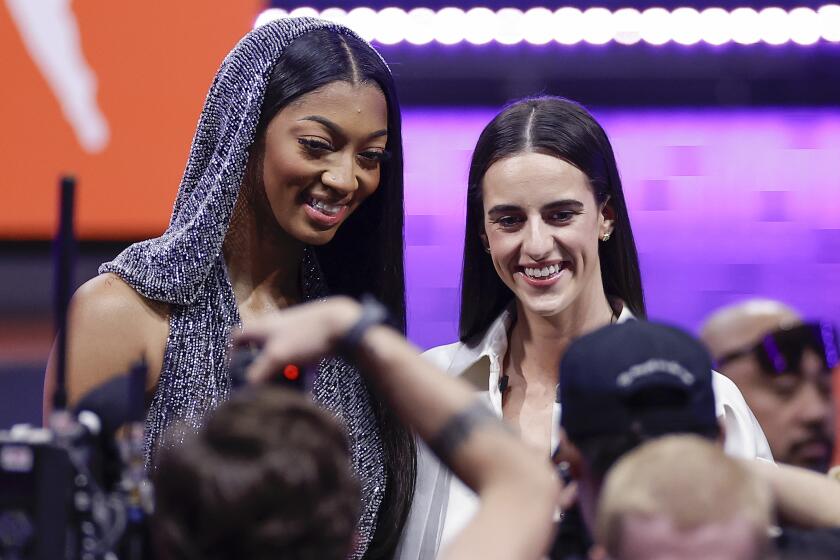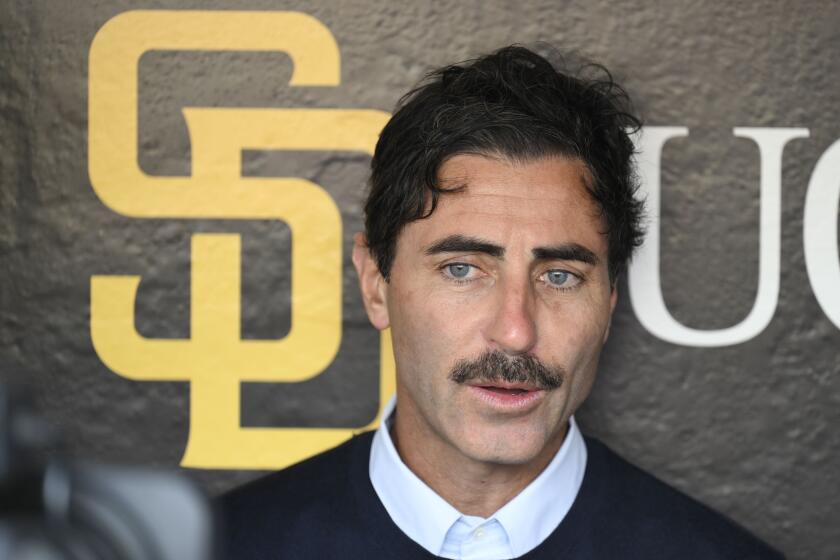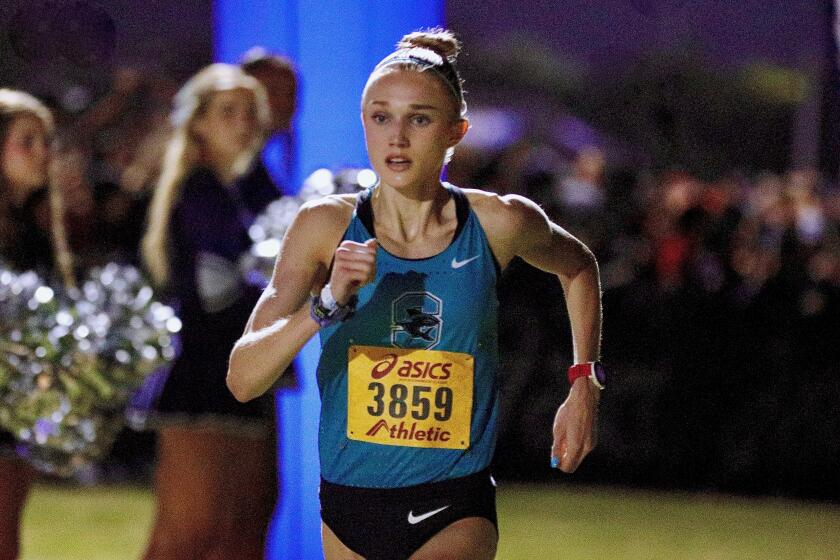Cycling stars’ clash rocks doping case
Two giants of American cycling collided in a Malibu courtroom setting Thursday, when former Tour de France champion Greg LeMond testified that reigning champion Floyd Landis implicitly confessed to using illicit testosterone last summer.
And in an additional disclosure that appeared to rock the defense team, LeMond accused Landis’ business manager of calling him anonymously Wednesday night in an apparent effort to intimidate him so he would not testify.
LeMond’s appearance on the fourth day of Landis’ doping hearing injected a sensational element. Until then the hearing had focused on the Paris lab where Landis’ urine samples had tested positive for testosterone after he won the 2006 race.
LeMond told the three-member arbitration panel that Landis called him shortly after the lab test results became public in July. LeMond had made public statements to which Landis objected, according to his testimony.
“I was expressing that if he was indeed positive, I hoped he would help the sport and come clean,” LeMond said. He described Landis as someone he had met but who was not a close acquaintance.
During the call he told Landis “you could single-handedly change the sport” by admitting guilt “and I believe you to be a good person in a bad sport that needs some cleaning up.”
Landis was “very defensive,” LeMond recalled. “He said, ‘What good would it do? ... If I did, it would destroy a lot of my friends and hurt a lot of people.’ ”
LeMond said he then told Landis that he had been sexually abused as a child, “and it really destroyed me to keep the secret.” He advised Landis, he said, “for your own help and your own future,” not to keep any such secret bottled up.
LeMond, 45, has become a controversial figure in cycling circles since testifying last year in an unrelated civil case that seven-time Tour de France winner Lance Armstrong had also confessed in his presence to doping.
His testimony Thursday went beyond claims of confessions, however. LeMond cited a cellphone call he received about 7 p.m. Wednesday from an anonymous caller whose number he traced back to Will Geoghegan, Landis’ manager.
According to LeMond’s testimony, the caller said, “This is your uncle and I’m going to be there tomorrow. We could talk about how we used to hide your weenie.”
He said he regarded the call as “a real threat” that his history would be publicly disclosed if he testified. He filed a complaint with law enforcement authorities in Calabasas, where he was lodging Wednesday night.
Geoghegan left the hearing room at Pepperdine University Law School soon after the disclosure and did not return. A Landis lawyer later informed arbitrators that the manager had been “terminated as of now.”
Because the Landis hearing is not a formal judicial proceeding, it may be difficult to charge Geoghegan with obstructing justice or tampering with a witness, legal experts said.
The impact of LeMond’s testimony on the arbitrators’ judgment is uncertain, in part, because he did not testify that Landis had explicitly admitted guilt.
Defense efforts to cross-examine LeMond were interrupted and ultimately blocked by lawyers for LeMond and the U.S. Anti-Doping Agency, which is prosecuting the case. As a result, the Landis defense team asked that LeMond’s entire testimony be stricken from the record, a request the arbitrators said they would consider later.
But in the court of public opinion, in which Landis has waged an aggressive public relations campaign, the testimony may undermine his emerging image as a straight-shooting athlete facing an unfair inquisition. It also could backfire against the USADA if the agency is seen to have resorted to gossip and innuendo to compensate for a weak technical case.
The furor overshadowed what had been shaping up as one of the Landis defense’s most effective days. A lab technician acknowledged she knew she was working with Landis’ urine sample when she did the testing to confirm her lab’s original positive finding.
She also acknowledged making various technical mistakes, including overwriting and obliterating data in violation of World Anti-Doping Agency lab standards.
Under international anti-doping rules, any significant departure from accepted laboratory standards in doping cases shifts the burden of proof from the athlete to the prosecuting organization, which must then prove that the flaws did not contribute to the positive test result.
LeMond entered the ranks of cycling’s elite in 1986, when he became the first American to win the Tour de France, the sport’s marquee event. He repeated that victory in 1989 and 1990, setting a record for Tour victories for Americans that was topped with Lance Armstrong’s third consecutive victory in 2001. Armstrong won four more times in a row before retiring in 2005.
The racers had a public falling out in 2001 over LeMond’s belief that Armstrong had doped with the performance-enhancing drug EPO, which Armstrong denied.
Their relationship soured further last year when LeMond publicly claimed that Armstrong had “threatened my wife, my business, my life” because of his deposition in the lawsuit. Armstrong denied threatening LeMond.
LeMond’s relationship with Landis was also strained. In a comment Landis posted in November on a widely read cycling discussion group online, he expressed concern that the substance of his original conversation with LeMond was about to become public and would be “misconstrued.”
He appeared to blame LeMond, and added: “If he ever opens his mouth again and the word Floyd comes out, I will tell you all some things that you will wish you didn’t know and, unfortunately, I will have entered the race to the bottom which is now in progress.”
After his appearance on the stand, LeMond told reporters that the posting “shows another side of Floyd Landis that the public hasn’t seen.”
LeMond also expressed strong support for the sports anti-doping establishment, saying, “When I hear people saying you can’t win the Tour de France without drugs, well, I did. There have been a lot of people who don’t want to look at the truth about cycling.”
*
More to Read
Go beyond the scoreboard
Get the latest on L.A.'s teams in the daily Sports Report newsletter.
You may occasionally receive promotional content from the Los Angeles Times.
